1. Introduction
Selecting the right office furniture is a critical decision for any business, especially for brand owners, wholesalers, distributors, and traders involved in the B2B sector. The office environment significantly impacts employee productivity, client impressions, and overall business efficiency. This guide aims to provide comprehensive insights into the various aspects of purchasing office furniture in bulk, helping you make informed decisions that align with your business needs and goals.
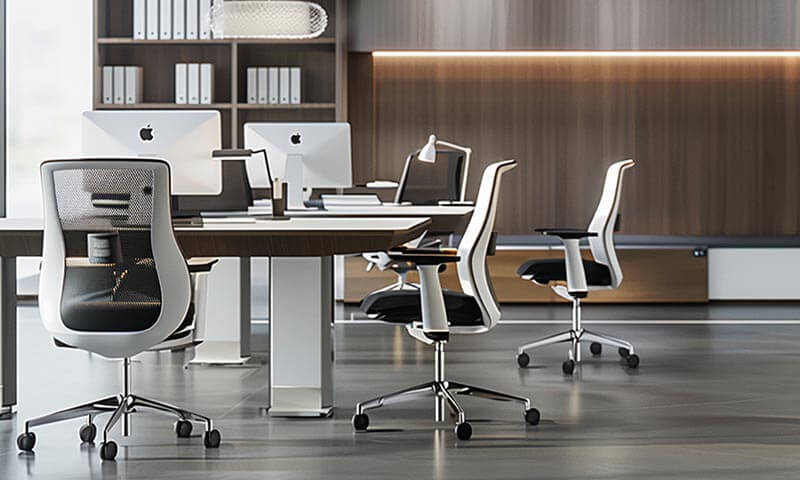
2. Assessing Market Needs
When purchasing office furniture for large-scale distribution or reselling, understanding market demands is essential. Here’s how to assess your market needs effectively:

- Market Research: Begin by analyzing current trends in the office furniture industry. Identify popular styles, materials, and functionalities that are in demand. Pay attention to emerging trends such as ergonomic designs and sustainable materials, which are increasingly sought after by businesses aiming to enhance employee well-being and corporate social responsibility.
- Identifying Key Buyers: Your primary buyers could include corporations, educational institutions, healthcare facilities, and government offices. Each segment has specific requirements. For instance, corporate clients may prioritize modern, sleek designs that project a professional image, while educational institutions might focus on durable, easy-to-maintain furniture.
- Budget Considerations: Establish a realistic budget that accommodates bulk purchases. Understand the pricing structures of suppliers and consider factors like bulk discounts, shipping costs, and potential tariffs. A well-planned budget helps you balance cost with quality, ensuring you get the best value for your investment.
3. Types of Office Furniture for B2B
Choosing the right types of office furniture is crucial when catering to diverse business needs. Below are key categories of office furniture that are essential for most business environments:
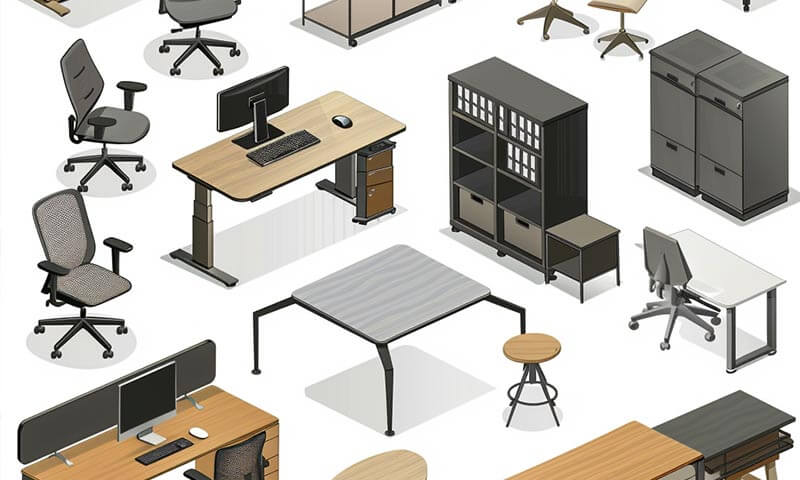
- Bulk Desks and Workstations
- Types: Offer a range of desks, including executive desks for senior management, modular systems for flexibility, and bulk workstations that optimize space for large teams. Modular workstations are particularly popular as they can be easily reconfigured to meet changing office layouts.
- Key Features: Look for desks with built-in cable management, adjustable height options, and ample storage. These features enhance functionality and help maintain an organized workspace.
- Commercial Seating
- Ergonomic Chairs: Ergonomic chairs are crucial for supporting employee health and productivity. They should offer adjustable height, lumbar support, and a swivel base. Bulk orders of ergonomic chairs can provide significant cost savings and ensure a consistent standard of comfort across the office.
- Additional Seating: Include options for conference and visitor chairs that are suitable for various business settings. Stackable chairs can save space and offer flexibility for meeting rooms and events.
- Storage Solutions
- Bulk Filing Systems: Different types of filing systems, such as lateral and vertical files, cater to varied storage needs. High-capacity filing cabinets are ideal for businesses that handle large volumes of paperwork.
- Storage Cabinets: Offer a range of cabinets, including locking options for sensitive documents and open shelving for easy access to frequently used items. Versatile storage solutions can help businesses maximize their space efficiently.
- Meeting and Conference Furniture
- Large Conference Tables: Provide various sizes and shapes, including rectangular, oval, and modular tables that can be reconfigured for different meeting setups. Consider tables with integrated power outlets and cable management for modern, tech-savvy environments.
- Conference Seating: Offer comfortable, ergonomic chairs for long meetings. Chairs with features like armrests and adjustable height can enhance comfort and support during extended sessions.
- Reception and Lounge Furniture
- Reception Desks: These are the first point of contact for visitors and should create a professional and welcoming impression. Offer desks in various styles and finishes to match different corporate identities.
- Waiting Area Seating: Provide options for comfortable and durable seating that can withstand high traffic. Consider modular seating arrangements that can be easily rearranged to suit different spaces and needs.
4. Material and Build Quality for Bulk Purchases
When purchasing office furniture in bulk, the choice of materials and the build quality are critical factors that influence durability, aesthetics, and cost. Here’s what to consider:
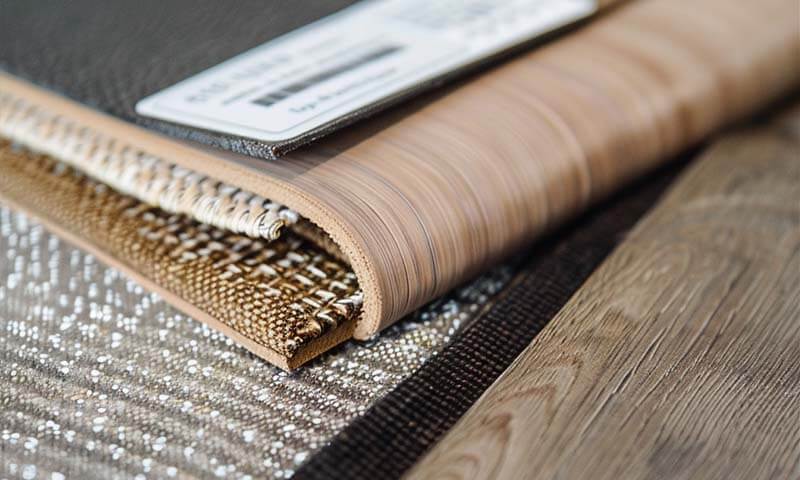
- Material Choices
- Wood: Wood is a classic choice known for its durability and timeless appeal. It’s available in various types such as hardwood, which offers strength and longevity, and engineered wood, which is more cost-effective and versatile.
- Metal: Metal furniture provides a modern look and robust durability, ideal for contemporary office designs. It’s resistant to wear and tear, making it suitable for high-traffic areas.
- Composite Materials: These include a variety of engineered products like laminates and composites, which are cost-effective and offer flexibility in design. They are often used in modern office furniture for their lightweight and durable properties.
- Quality Standards
- Construction Details: Look for well-constructed furniture with reinforced joints, sturdy frames, and high-quality finishes. These details are crucial for ensuring the longevity and resilience of the furniture, especially under heavy use.
- Certifications: Ensure the furniture meets industry standards for quality and safety. Certifications such as ISO or ANSI/BIFMA indicate that the furniture has been tested for durability, safety, and sustainability. This is particularly important for B2B clients who expect high standards and compliance with regulations.
By considering these factors, you can ensure that your office furniture not only meets the demands of your market but also stands the test of time, providing excellent value for your investment.
5. Ergonomics and Mass Comfort
When selecting office furniture for bulk purchase, ergonomics plays a crucial role in ensuring the comfort and productivity of end users. Here’s how to approach ergonomics for large-scale procurement:
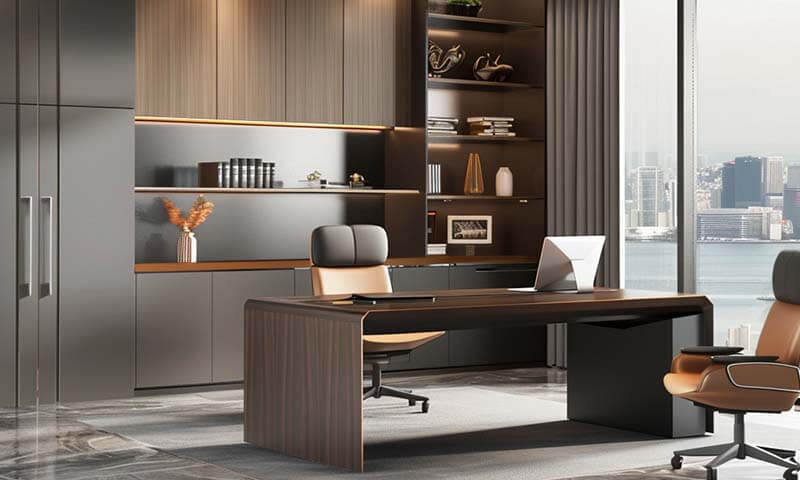
- Importance of Ergonomics: Ergonomically designed furniture minimizes the risk of discomfort and injury, leading to improved employee productivity and satisfaction. For businesses, investing in ergonomic furniture can reduce absenteeism and enhance workplace morale.
- Ergonomic Features for Mass Use:
- Adjustable Height Desks: These desks cater to users of different heights and preferences, allowing for both sitting and standing work positions.
- Chairs with Lumbar Support: Essential for reducing back strain, chairs should offer adjustable lumbar support, seat height, and depth to accommodate various body types.
- Footrests and Armrests: Ergonomic chairs should include adjustable armrests and footrests to provide additional support and comfort.
- Flexible Monitor Stands: Monitor stands that allow for height and angle adjustments can help maintain an ergonomic line of sight, reducing neck and eye strain.
- Choosing Ergonomic Furniture for Large Orders:
- Uniform Standards: Ensure that all furniture adheres to ergonomic standards to maintain a consistent level of comfort across different workplaces.
- Bulk Ergonomic Assessments: Consider conducting ergonomic assessments for bulk orders to ensure the furniture meets diverse needs and complies with health and safety standards.
- Customization Options: Offer customizable ergonomic features to meet the specific requirements of different businesses and industries.
6. Style and Aesthetics for Corporate Environments
The style and aesthetics of office furniture play a significant role in creating a professional and appealing work environment. When purchasing in bulk, it’s important to consider how the furniture will fit into various corporate settings:
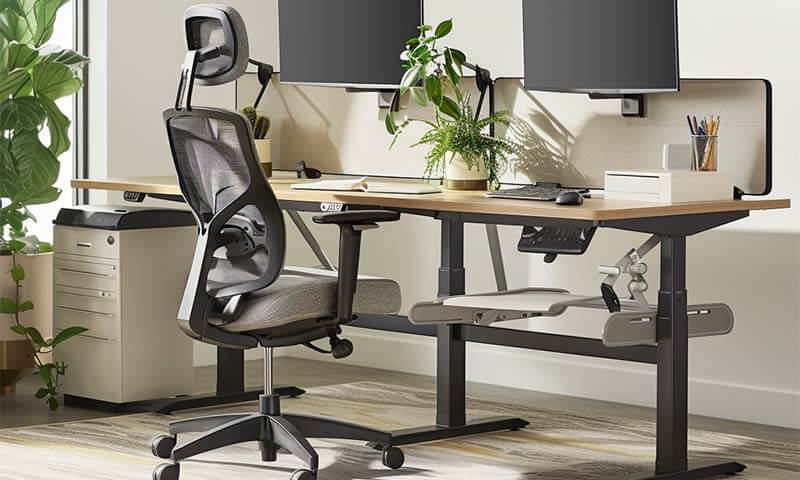
- Matching Business Themes: Office furniture should align with the corporate identity and branding of the business. This includes choosing furniture that complements the company’s color scheme, logo, and overall aesthetic. For example, a tech company might prefer sleek, modern furniture, while a law firm might opt for more traditional styles.
- Color and Finish Options:
- Consistency Across Orders: Ensure that bulk orders maintain consistent color and finish to create a cohesive look throughout the office.
- Variety for Different Needs: Offer a range of color and finish options to suit different corporate environments, from minimalist designs to more elaborate setups.
- Design Trends in Office Furniture:
- Modern Minimalism: Clean lines, simple designs, and neutral colors are popular in contemporary office furniture. These designs create a clutter-free and professional atmosphere.
- Sustainable Design: Furniture made from eco-friendly materials and designed for minimal environmental impact is increasingly sought after. This trend not only appeals to environmentally conscious businesses but also enhances corporate social responsibility.
- Flexible Workspaces: Modular and adaptable furniture that supports various work styles and spaces is becoming essential. Look for designs that can be easily reconfigured to meet changing business needs.
7. Environmental and Ethical Considerations
In today’s market, many businesses prioritize sustainability and ethical practices. As a B2B buyer, incorporating these considerations into your purchasing decisions can enhance your reputation and meet the growing demand for environmentally responsible products:
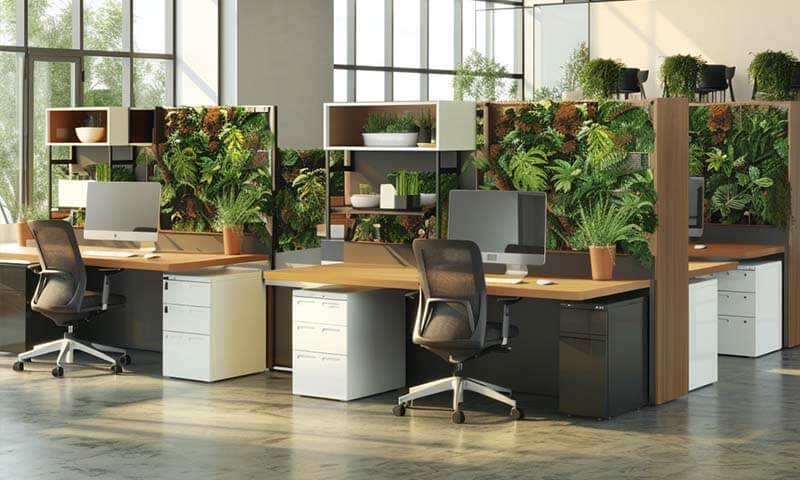
- Sustainable Materials:
- Eco-friendly Options: Choose materials like bamboo, recycled wood, and metal, which have a lower environmental impact. These materials are durable, recyclable, and often more cost-effective in the long run.
- Low VOC Finishes: Furniture finished with low volatile organic compounds (VOCs) is better for indoor air quality and the environment. Ensure that your bulk orders specify finishes that are safe and eco-friendly.
- Certifications for Green Furniture:
- FSC Certification: The Forest Stewardship Council (FSC) certification ensures that wood products come from responsibly managed forests that provide environmental, social, and economic benefits.
- LEED Certification: The Leadership in Energy and Environmental Design (LEED) certification indicates that furniture meets stringent environmental standards for sustainability.
- BIFMA Level: This certification from the Business and Institutional Furniture Manufacturers Association (BIFMA) signifies that the furniture has been evaluated for its environmental impact throughout its life cycle.
- Corporate Social Responsibility:
- Ethical Sourcing: Ensure that your suppliers adhere to fair labor practices and source materials ethically. This not only supports sustainable development but also enhances your business’s ethical profile.
- Waste Reduction and Recycling: Choose furniture that is designed for easy disassembly and recycling at the end of its life cycle. This helps reduce waste and supports a circular economy.
8. Supplier and Vendor Evaluation

Selecting the right supplier is crucial for ensuring the quality and reliability of your office furniture purchases. Here’s how to evaluate and choose the best vendors for bulk orders:
- Finding Reliable B2B Suppliers:
- Reputation and Experience: Look for suppliers with a solid reputation and extensive experience in the office furniture industry. Check reviews, ask for references, and assess their history of delivering bulk orders.
- Product Range and Customization: Choose suppliers that offer a wide range of products and are willing to customize furniture to meet your specific needs. Flexibility in design and production is a key indicator of a reliable supplier.
- Negotiating Bulk Orders:
- Bulk Discounts: Leverage your purchasing power to negotiate discounts for large orders. Suppliers often provide significant price reductions for bulk purchases, which can greatly reduce your overall costs.
- Terms and Conditions: Ensure that the terms of the contract are favorable, including delivery times, payment schedules, and return policies. Clear and fair terms can prevent future disputes and ensure a smooth procurement process.
- Understanding Logistics:
- Delivery and Installation: Assess the supplier’s capabilities in handling large-scale delivery and installation. This includes their logistics network, the reliability of their delivery schedules, and their ability to install furniture on-site.
- After-sales Support: Choose suppliers that offer comprehensive after-sales support, including maintenance services, warranties, and a responsive customer service team. This ensures that you have support in case of any issues with the furniture.
By following these guidelines, you can make informed decisions that ensure the success of your office furniture procurement, meeting the needs of your clients and enhancing your business’s reputation.
9. Maintenance and After-Sales Service
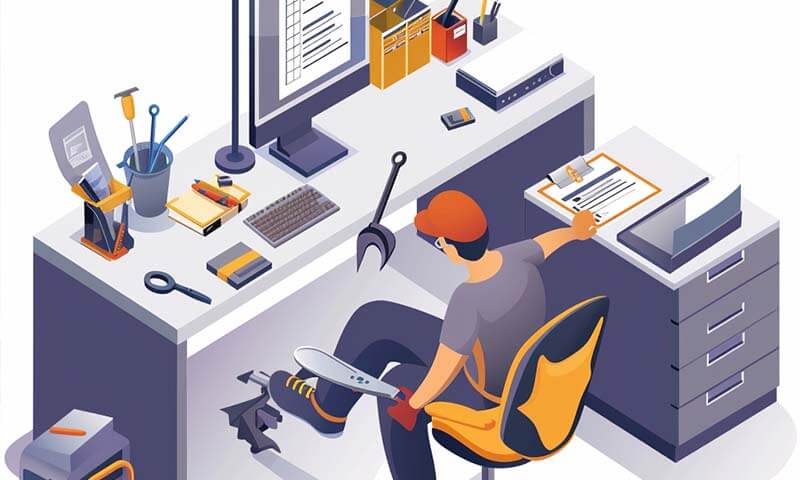
Ensuring that the office furniture you purchase in bulk remains in good condition over time requires a robust maintenance and after-sales strategy. Here’s how to manage these aspects effectively:
- Maintenance Tips for Bulk Furniture:
- Regular Cleaning: Establish a routine cleaning schedule to maintain the furniture’s appearance and prolong its lifespan. Use appropriate cleaning products for different materials (e.g., wood polish for wooden furniture, mild detergent for metal or plastic surfaces).
- Preventive Care: Implement preventive measures such as using coasters to prevent water damage, placing protective pads under heavy items to avoid scratches, and regularly checking for and tightening any loose screws or bolts.
- Handling Wear and Tear: Address minor damages promptly to prevent them from becoming major issues. For example, touch up scratches on wooden surfaces, replace worn-out chair wheels, and repair or replace any damaged upholstery.
- Repair and Replacement Policies:
- Warranty Coverage: Ensure that your bulk purchases come with comprehensive warranties that cover common issues such as manufacturing defects, material failures, and structural damage. Understand the terms and conditions to know what is covered and for how long.
- Supplier Support: Choose suppliers that offer robust support for repairs and replacements. This includes having spare parts available and providing quick turnaround times for service requests.
- Long-term Service Agreements:
- Maintenance Contracts: Consider establishing long-term maintenance contracts with your suppliers. These contracts can cover regular inspections, cleaning services, and repairs, ensuring your furniture remains in top condition and reducing downtime due to maintenance issues.
- Service Level Agreements (SLAs): Negotiate SLAs that outline the expected service standards, response times for maintenance and repair requests, and penalties for non-compliance. This ensures accountability and provides a clear framework for addressing maintenance needs.
10. Cost-Efficiency and Savings
Achieving cost-efficiency in bulk office furniture purchases involves strategic planning and exploring various cost-saving options. Here’s how to optimize your spending:
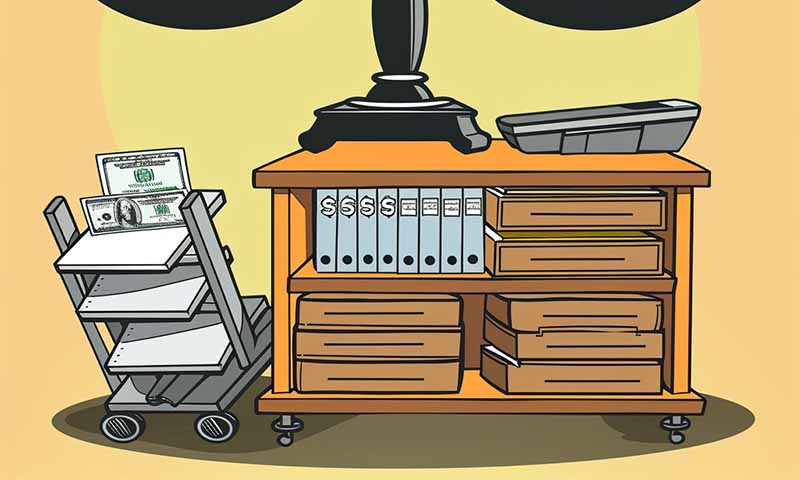
- Bulk Buying Benefits:
- Economies of Scale: Purchasing in large quantities often results in lower per-unit costs due to economies of scale. This can lead to significant savings on large orders, making bulk buying a cost-effective option for businesses.
- Negotiated Discounts: Leverage your purchasing power to negotiate better terms and discounts with suppliers. Bulk orders give you greater bargaining power, which can lead to more favorable pricing and payment terms.
- Exploring Wholesale and Distributor Discounts:
- Wholesale Partnerships: Establish relationships with wholesale suppliers who offer significant discounts for bulk purchases. These partnerships can provide you with access to a wide range of products at competitive prices.
- Exclusive Offers: Look for suppliers that offer exclusive deals, such as early access to new product lines, volume-based discounts, or special promotions for bulk buyers. These offers can further enhance your cost savings.
- Evaluating Second-hand Bulk Options:
- Cost Savings: Second-hand furniture can offer substantial cost savings compared to new items. For businesses on a tight budget, or those looking to furnish temporary or secondary offices, this can be an economical solution.
- Quality Considerations: Ensure that the second-hand furniture is in good condition and meets your quality standards. Inspect the items thoroughly for any signs of wear and tear, and verify that they are still covered by any applicable warranties or guarantees.
11. Conclusion
Investing in office furniture is a significant decision for any business, particularly for those involved in bulk purchasing and B2B trade. By understanding the key factors involved in selecting, maintaining, and optimizing your furniture investments, you can ensure that your office spaces are both functional and aesthetically pleasing.
